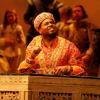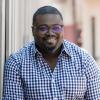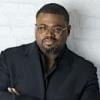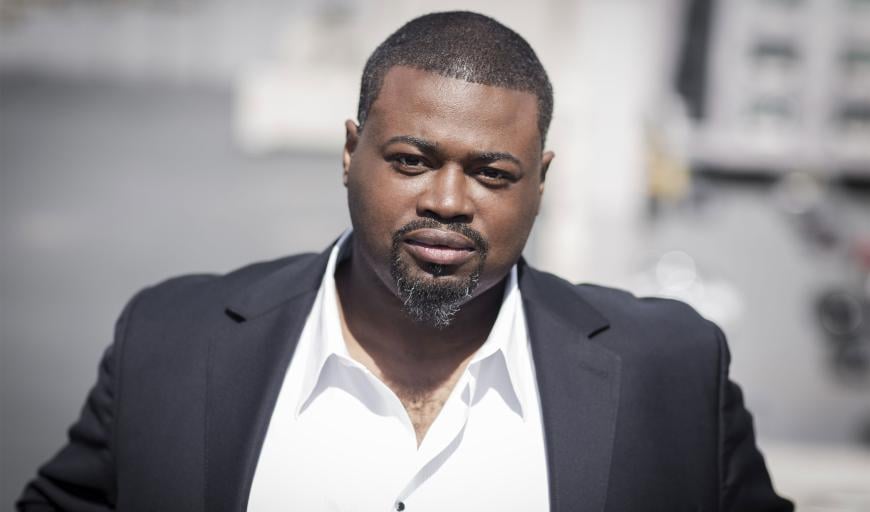
More often than not when a tenor is said to “wear his heart on his sleeve,” it’s a backhanded compliment. But in the case of tenor Russell Thomas, an openly gay man, the term is not just a compliment; it’s a bold declaration of his sincerity and artistic identity.
“I use every experience, every breakup, every one-night stand, good and bad, to shape a character and shape a phrase in music. I don’t shy away from who I am,” Thomas stated in a Dec. 9 interview in The Advocate. “When I was a closeted gay man and not secure in who I was, I don’t feel I sang well. ... As soon as I was more open and free with who I was, I feel like I sang better.”
Thomas’s powerful tenor voice and emotional honesty were on display Saturday at Zipper Hall in a recital presented by Los Angeles Opera and accompanied by members of the LA Opera Orchestra. Thomas has been the company’s artist-in-residence since 2021, and he will appear in the title role of Verdi’s Otello with LAO this May and June.
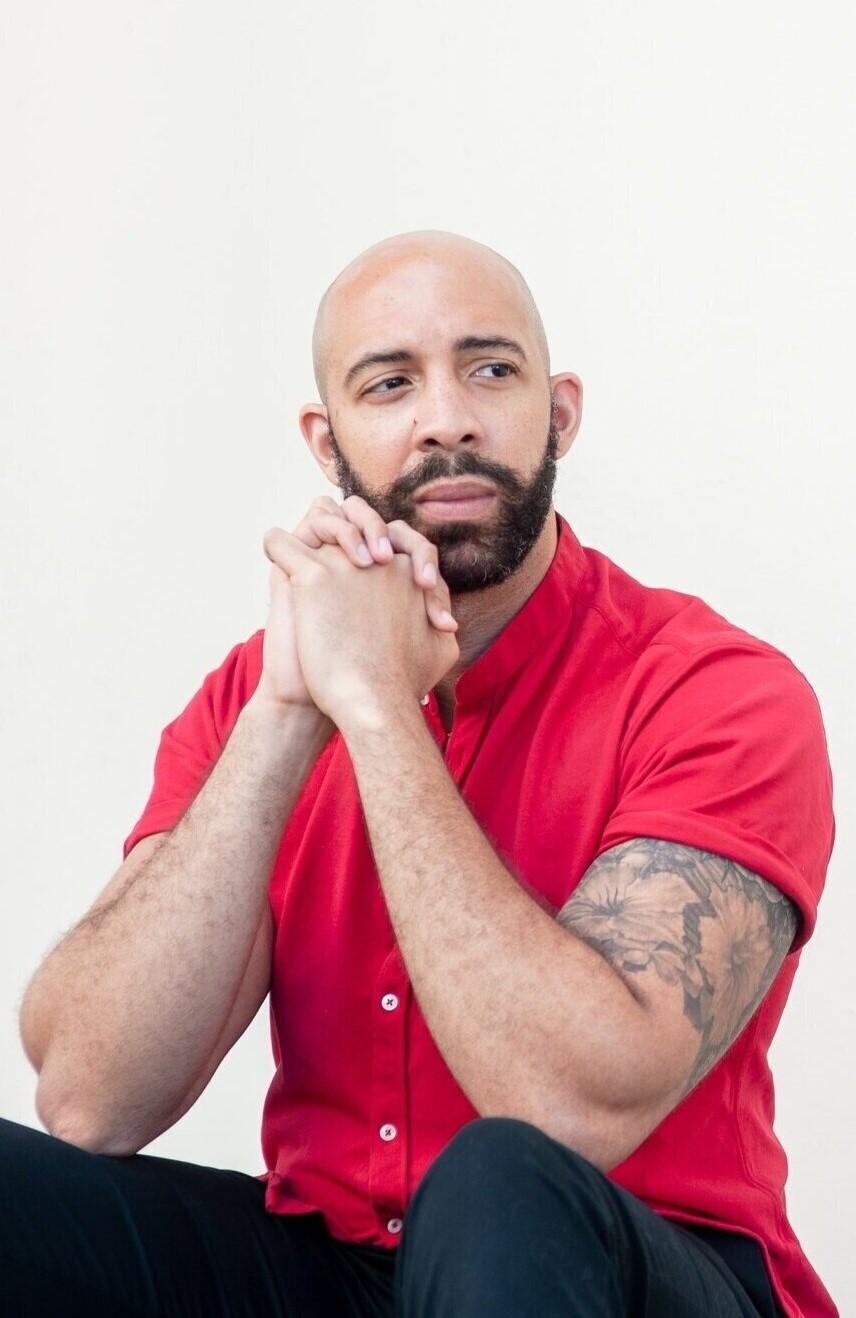
The more rhapsodic half of Thomas’s program was devoted to performances of Adolphus Hailstork’s Four Romantic Love Songs and H. Leslie Adams’s Nightsongs. The more melodically and emotionally complex half featured a trio of world premiere works commissioned by Thomas: To Harlem With Love by Dave Ragland, Annunciation by Damien Geter, and Love and Light by Jasmine Barnes. All three works were composed in 2022.
The tonal and emotional spectrum of the two parts could not have been more polar. Presented in a new arrangement for string quintet by Hailstork, Four Romantic Love Songs (to texts by Paul Laurence Dunbar) begins with “My Heart to Thy Heart,” a vocally expansive ode to “my African maid,” whose “Kisses are wine / Brewed for the lover in sunshine and shade.” Softening the mood, Thomas crooned “Invitation to Love” as a nocturne, while “Longing” and “Good-Night” were infused with melodies reminiscent of an English or Irish ballad.
Adams’s Nightsongs (to the poems of Langston Hughes) reflects a deeply rooted connection to African American heritage. “Prayer” is distinctly influenced by Black spirituals, a realm in which Thomas, having spent much of his youth singing in church, feels totally comfortable. He is a tenor whose middle and lower register are rich and deeply resonant. His high notes, however, were less reliable and sometimes strained.
The first of the three premieres, To Harlem With Love, could almost have been drawn from the realm of operetta with its sweeping romantic melodies and poetry of trysts in shadowy places. The diverse lyrics are by Countee Cullen (“The Dance of Love”), Gwendolyn Bennett (“Sonnet 2”), Helene Johnson (“Remember Not”), and Arna Bontemps (“Length of Moon”).
The recital was beginning to feel like too much sugar. Then came Geter’s Annunciation, to an exceedingly homoerotic text by Joshua Banbury. It was here that Thomas finally exhibited the level of vocal emotionality and expressive freedom he had discussed in his interview. This was a love song inspired by lust and sweat: graphic, honest, and passionate.
The score, conducted by Lucas Nogara, evokes the intricate harmonies, rhythms, and textures of Benjamin Britten and Samuel Barber. This is music that grabs the listener, as when Thomas sang, “Into my room, he reascends. Into my room and it begins. All at once like some fever dream. He comes in to engender me. Into my room he reascends. Into me. And it begins.”
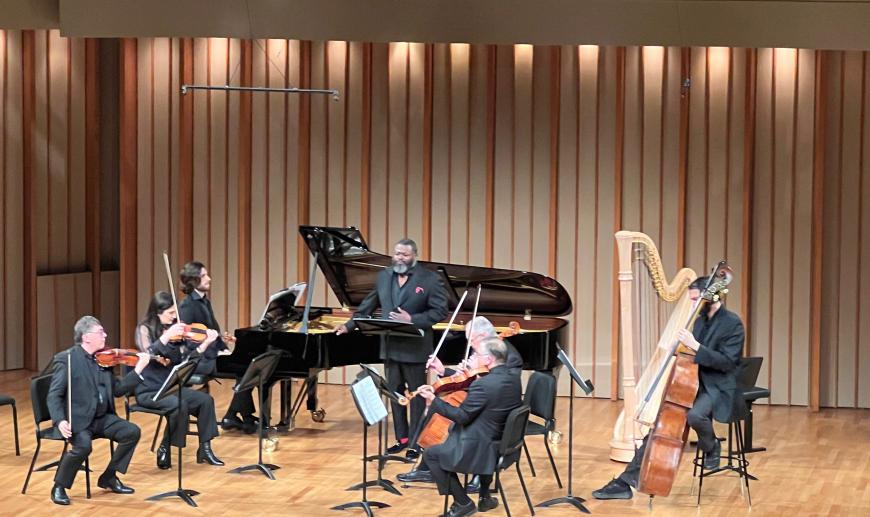
This was a song that was both lovingly romantic and emotionally dangerous, with Thomas as our guide into forbidden territory. “How the fruitful form moves in mine. Man in man together. Limp in ecstasy divine.” Finally exhausted, lust turns to reverie: “I will take you to a lake. Undress in the morning light. Leave nothing in our wake. Undress beloved. ... As sunlight burned on the lake, he moved in me. Ah.”
Barnes’s Love and Light, which concluded the recital, further explored the freedom of coming out to face one’s true self. “A shadow of fear, not allowed to shine. I’ve mastered threat in silhouette” — a sentiment reminiscent of Ralph Ellison’s Invisible Man and the smoldering spirit in the pages of James Baldwin — gay, Black, and proud.
It was refreshing. It was engaging. It was exciting.
Throughout the performance, the interchanging members of the LA Opera Orchestra included a core quintet of Roberto Cani (concertmaster), Ana Landauer (second violin), Shawn Mann (viola), John Walz (cello), and Lucas Nogara (piano); they were supplemented by Amy Tatum (flute), Leslie Reed (oboe), Nathan Farrington (bass), and JoAnn Turovsky (harp). All played with brilliance and commitment.


